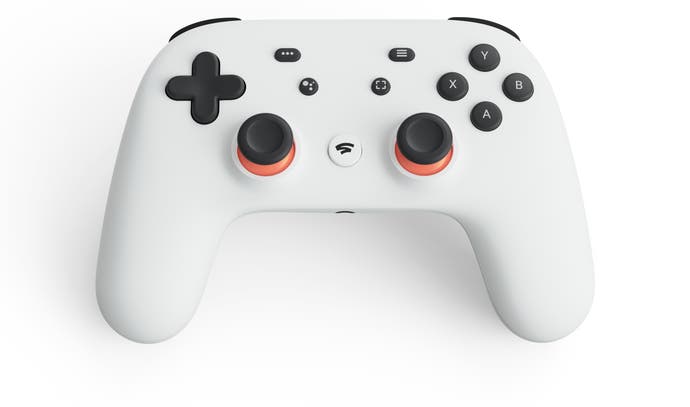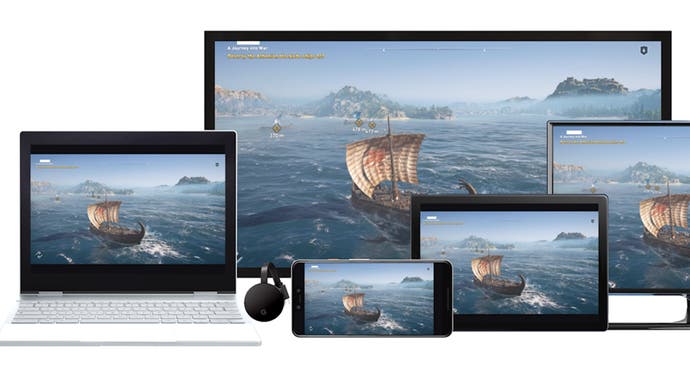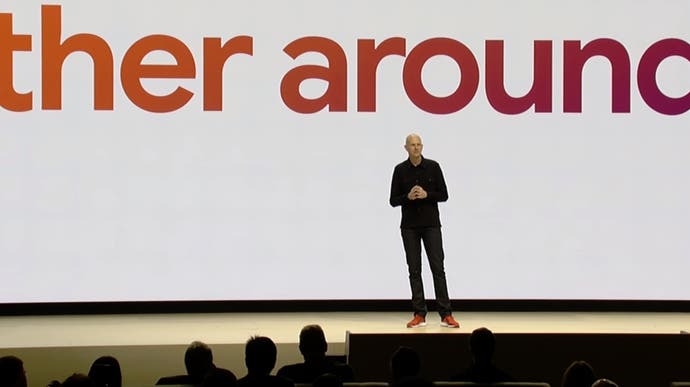Stadia offers a thrilling new vision, but are Google and gaming ready for each other?
The big pitch.
Will Stadia work? Right now, I can't tell you. Google's game streaming service, revealed at the Game Developers' Conference this week, has the infrastructure might and engineering genius of the world's biggest tech company behind it. Early tests of the service and of last year's Project Stream prototype are encouraging; Google says it will be able to lower the 25-megabits-per-second connection requirement for Project Stream by the time of Stadia's launch later this year. That brings it within reach of the average UK home broadband connection - in theory. But until it's available at scale in the real world, in real households, with real internet usage patterns, we won't really know.
Will Stadia succeed? This, too, is impossible to answer on the information we have. We don't know how it will be priced or indeed what the business model will be. (Subscription, like Netflix? Purchase, like iTunes? Will there be any upfront cost beyond the controller - if you even need that?) Even more importantly, we hardly know about any games.The signing of id's Doom Eternal is the only indication we have of support from the majors, and one mysterious title from Q Games is the only exclusive we know about. It's not much to go on, but we can expect to hear more in the summer, presumably around E3 time.
What Google has managed to do is make cloud gaming's inevitable rise sound exciting. Stadia is, if nothing else, an entirely new vision for video games which upends their technology and makes them more accessible than ever before.
The reaction to game streaming among players is often sceptical. In the move from local hardware to a data centre, it feels like something will be lost. This is a practical issue for players: input lag might make your games feel sluggish or your multiplayer performances uncompetitive. But it's also an emotional one. The promise of video games has always rested in the idea of something magical, a crackling spark of imagination, happening in the direct interface between player and machine. With streaming, there's a worry that this urgent connection will be broken.
But we have been so concerned with whether cloud gaming can match up to the experience we know and love, we haven't stopped to ask what new experiences it might offer. The overriding message of the Stadia reveal was that cloud gaming will be different.
Start with the quality-of-life improvements that could have a profound effect on your gaming time: cloud gaming may introduce a barrier between player and game in one sense, but elsewhere it tears barriers down with abandon. Never download a game or a patch or a system update again. Never be more than seconds away from playing any game. Load times obliterated by ultra-fast storage. Less power consumed, battery life extended. Your game and your profile available wherever you are, on whatever device. These are huge wins for the modern player, and they're common to any game streaming system.
Stadia, however, goes further. It is unlike other streaming platforms - including its chief rival, Microsoft's forthcoming xCloud - in that it will have no local counterpart, no sister box sitting under TVs, defining the baseline of what it can and can't do. It's cloud-native, and this has major implications.
Storage is, in real terms, limitless, as well as being lightning-fast. Computing power is unrestrained by the need to squeeze it into a cost-efficient, heat-efficient plastic box. More significant is that it scales; in theory, developers can access the power of more than one 'instance' (what we would normally think of as a console) if they need to. And it scales over time, too. Google can and will increase the spec of the platform whenever it likes, at no cost or inconvenience to the user. Reframed in this way, some of the limitations game developers are used to working within start to become meaningless. Most exciting of all are the prospects for multiplayer gaming, where clients and servers will sit side-by-side in data centres and be able to exchange huge amounts of data instantaneously, removing the traditional bottlenecks and meaning rich simulations involving thousands of players suddenly become possible.
All of this makes Stadia the most exciting new gaming platform in decades. Since the dawn of 3D-accelerated graphics and the rise of online gaming in the mid-1990s, we have become used to gaming technology offering us refinements on what we already have, so it is a thrill to encounter a new system that reframes what is possible. When was the last time a new generation changed how you thought about games?
After several generations in which competing platforms got closer and closer to each other in terms of specification and design philosophy - with the noble exception of Nintendo, of course - it is also thrilling to see two giants propose quite different visions of what a gaming platform should be. Microsoft, with its Xbox-based xCloud, wants to put the gaming that you already know everywhere. Google wants to transform gaming by using the cloud to open up new frontiers of game design and technology, and by erasing the boundaries that exist between games, streaming video and the internet in general.
This sounds like I find Google's vision more exciting than Microsoft's. And I suppose, for its audacity and its possibilities, I do. But it's not that simple.
Google's pitch is based on technology, with the assumption that where technology goes, content will follow. That is not a given. I am reminded of John Carmack demonstrating a homebrew Oculus headset to me in 2012 and my first taste of Valve's Vive prototype in 2015. On both occasions, I was awed, but years later, while VR gaming has developed into an interesting niche, we are still waiting for answers to the questions posed by this technology.

In order to realise the promise of cloud-native gaming, Google needs killer exclusive games designed specifically for Stadia. It has founded its own studio, but this appears to be in the early stages - its boss Jade Raymond has only just started work. Google has not made any major acquisitions or exclusive signings that we know about. My sense is that platform-defining, mass-market exclusives for Stadia are still years away.
Compare this to Microsoft's own entry into the console market back in 2001, which was regarded with suspicion by gamers at the time. (Compared to the arrival of Google, a company with a terrifying command over the global flow of information and limitless influence in public and private life, the entry of a boring office-software company into the gaming market now seems pretty benign.) Xbox was impressively specced and well-engineered, but Microsoft knew this would be for naught without the right game to show off its new system and win gaming's most passionate fans round. So it acquired Bungie, made Halo a launch title, and the rest was history.
It's an ironic detail that the Stadia project is led by Phil Harrison, a games industry veteran with many notable achievements under his belt, but whose last high-profile engagement was as part of the team that steered Xbox off this path and almost onto the rocks with the Xbox One launch in 2013. Interviewed about Stadia now, Harrison is as confident and persuasive as ever, but as he reels off hyperbole about Google's networking prowess and the synergy between Stadia and YouTube, he sounds much more like a kool-aid-drinking Google executive than gaming's man within the machine.
Across the aisle is Phil Spencer, who brought Xbox back from the brink and refocused it on what matters to players. And tellingly, Microsoft's pitch is not so much about technology as about games, games, games. Its xCloud streaming platform is comparatively humbly specced. But it will be an integrated part of a gaming brand that has become strikingly platform-agnostic and encompasses massive games like Halo and Minecraft, a backwards compatibility initiative aimed at keeping older Xbox games playable, and the Game Pass subscription service which seems tailor-made for streaming. Spencer has also been on an acquisition spree, notably snapping up smaller studios whose work has a strong human dimension, like Ninja Theory and Obsidian Entertainment. None of this is going to revolutionise video games. But all of it is video games. And it is, always, all about the games.

The fact is that, despite the many on-stage pronouncements to the contrary at GDC, Google hasn't come to video games through a passion for video games. It has come to them through YouTube, where it has acquired a colossal gaming audience almost by accident. And it is through YouTube, primarily, that Google wants you to come to Stadia. For sure, the ability to click straight from a YouTube video of a game to playing the game - perhaps even the same instance of it - is marketing leverage that ought to strike terror into the hearts of Google's competitors. But it also opens a direct line between the platform and a swarm of toxic communities and troublingly amoral creators that YouTube has an abysmal record of trying to manage. Not all developers are going to be as enthused by this as Google seems to think. Share State, too, which allows game progress and setup to be shared in a link, is a brave innovation which will have some fascinating applications, but which also has the power to break game design or badly misrepresent a game's content. Is it responsible to place such a powerful tool in the hands of communities that Google has shown itself unable to control?
This is the point at which we have to raise the question of what Google is, and what it wants with us. You don't have to ascribe sinister motives to this tech giant to be worried about how dangerously ubiquitous its influence over our lives is, or how inept or disinterested it can be in managing the effects of its disruption. Anyone who has lived through its effect on journalism knows this. It feels like Google wants games just because it wants everything. That said, true passion for games can be learned - and lost, and relearned. Just ask Microsoft.
With Stadia, Google is creating a tremendously powerful and flexible platform that has the potential to transform how we play, make and think about video games. But it may take the gaming world some time to catch up with Google's vision. And it certainly seems like Google still has a bit to learn about the industry and art form it plans to disrupt - and quite a lot of work to do to make sure that disruption is positive.



